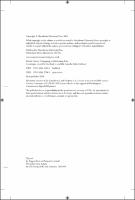Chapter 4 Quarantine in Ceuta and Malta in the travel writings of the late-eighteenth-century Moroccan ambassador Ibn Uthmân Al-Meknassî
Author(s)
Ezzahidi, Malika
Collection
EU collectionLanguage
EnglishAbstract
This chapter examines the writings of the renowned late-eighteenth-century Moroccan ambassador Ibn Uthmân Al-Meknassî, the first known traveller from his country to leave an account of European quarantine as experienced during his two diplomatic missions in Spain’s Ceuta (1779) and Malta’s Valletta (1782). It shows that quarantine, on the one hand, acted as a marker of otherness by which Ibn Othman was identified as a Muslim, though this was not a uniform process, owing to the fact that significant differences existed in the degree of alterity experienced in Spain and Malta, and indeed other parts of the Mediterranean. The subjective opinion on quarantine, on the other hand, was also one of the means through which Ibn Uthmân situated himself within Makhzen (Moroccan government) elites at a time when a division between those who declared themselves in favour of European-style modernisation and those who advocated a rejection of European novelties was already visible.
Keywords
ibn uthmân al-meknassî; spain; diplomatic missions; morocco; 18th century; quarantine; malta; muslim identity; ibn uthmân al-meknassî; spain; diplomatic missions; morocco; 18th century; quarantine; malta; muslim identity; Ceuta; Epidemic; Mediterranean Sea; Tangier; Travel literatureOCN
1030821253Publisher
Manchester University PressPublisher website
https://manchesteruniversitypress.co.uk/Publication date and place
2018Series
Social Histories of Medicine,Classification
European history
History and Archaeology
c 1500 onwards to present day
Social and cultural history
Society and Social Sciences
History of medicine


 Download
Download Web Shop
Web Shop